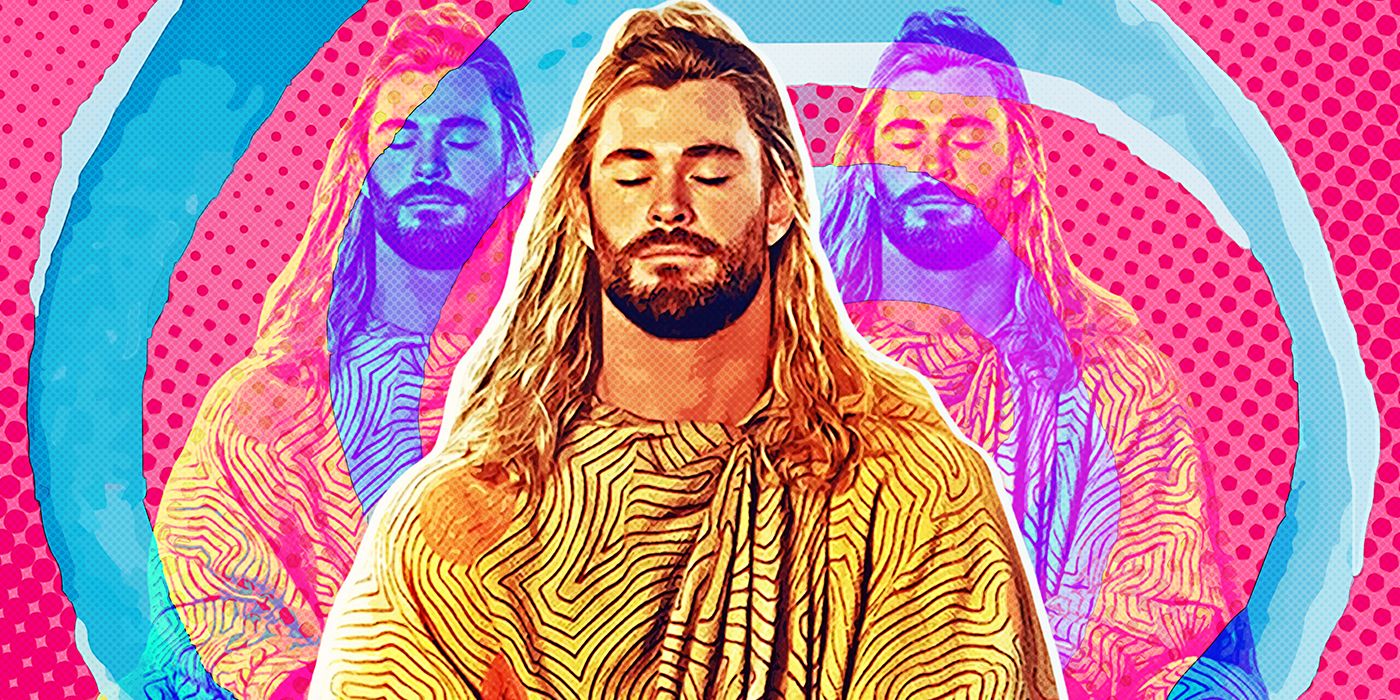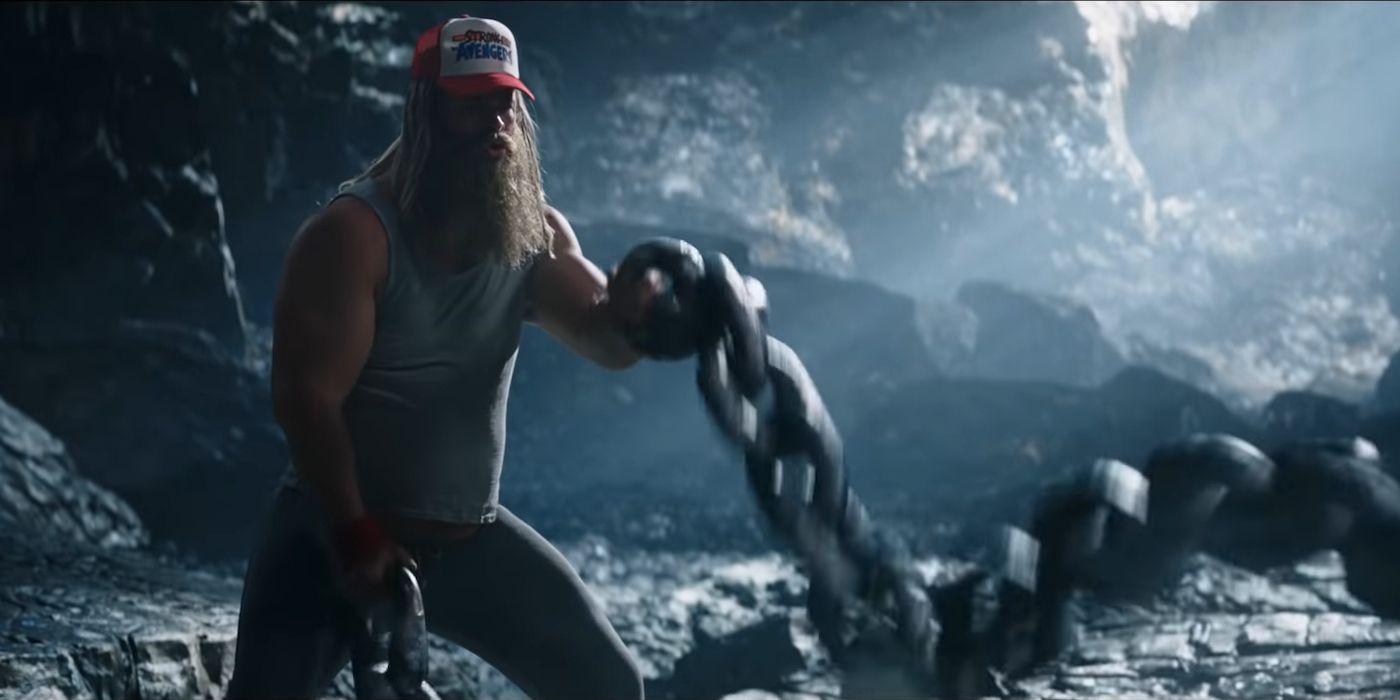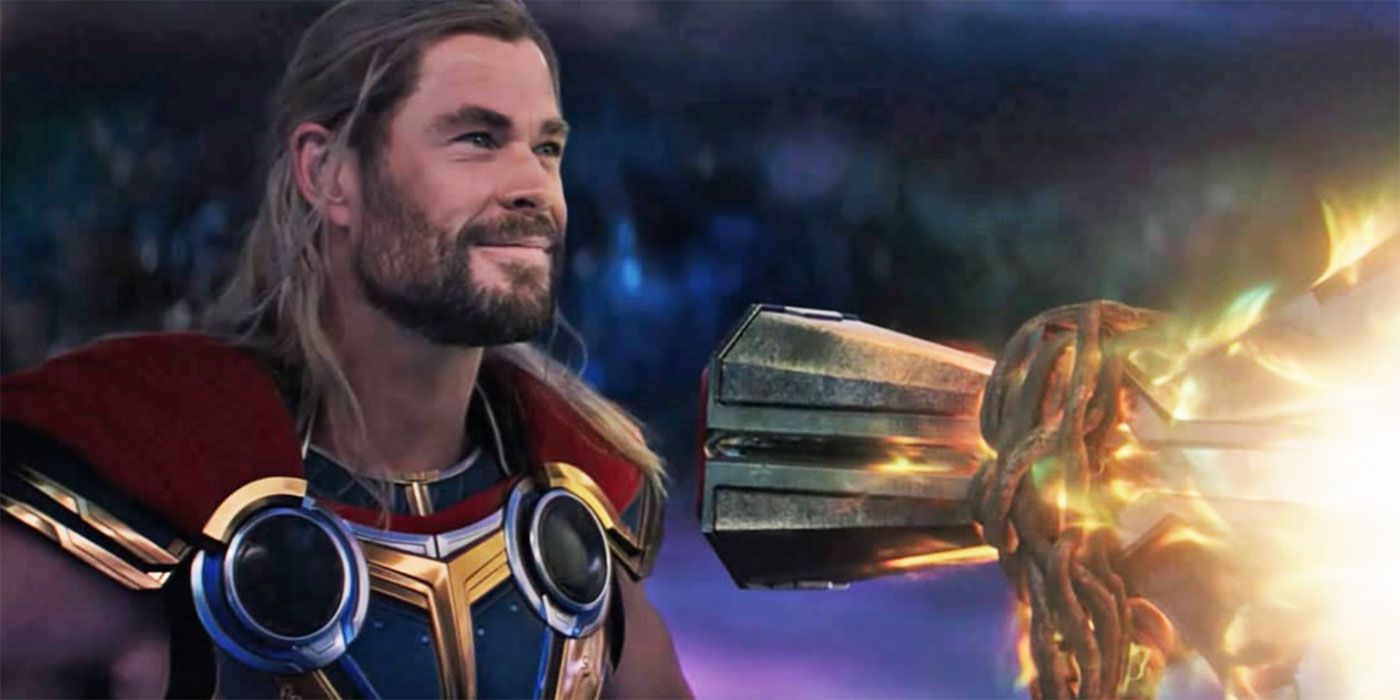Editor's Note: The following contains Thor: Love and Thunder spoilers.Ever since we first met Thor Odinson back in 2011’s Thor, the name of the game has been worthiness. What brought the God of Thunder to Earth in the first place was his quest to once again wield the hammer Mjölnir, therefore proving his worth in the eye of his father Odin. After several world-saving adventures and three standalone films, the Thor we find at the beginning of Thor: Love and Thunder is almost certainly “worthy,” but he’s also more lost than ever. He’s a God, sure, but who is he? In Marvel’s latest feature film, Thor finally finds his purpose by allowing himself to be more than a God. By challenging what a God can and should be, Taika Waititi’s second film in the space Viking franchise reminds us that the worthiest thing anyone can do is to help others, but that you don’t have to be at your most helpful by going it alone.
At the top of Love and Thunder, Thor (Chris Hemsworth) is about as unmoored and disconnected as we’ve ever seen him. This is the first film in the franchise not to feature any other members of Thor’s immediate family. As Korg (Waititi) reminds us in the opening narration, we’ve seen Thor lose his mother, his father, each member of the Warriors Three, and, of course, Loki (multiple times). Thor is traveling alongside the Guardians of the Galaxy, but we quickly learn that Thor spends most of his time on his own, waiting for the phrase, “Thor, we need your help to win this battle.” Once he’s activated, Thor does indeed spring into action (it’s what he was taught to do, after all), and, while he gives rousing pre- and post-battle speeches about the team working together, Thor pretty much saves the day all by himself.
Surprisingly, it’s Peter Quill (Chris Pratt) of all people who confronts Thor about how shut off he currently is. Having reckoned with his own recent loss of romantic love, Quill reminds Thor, “that shitty feeling is better than feeling empty.” After parting ways with the Guardians, there’s little else to distract Thor from that empty feeling except for a distress call from his old warrior friend Sif (Jaime Alexander). And so off we go on another “classic Thor adventure,” hiding deep loneliness within exuberance and the ability to kick ass in any fight.
Also fighting battles on her own is Dr. Jane Foster (Natalie Portman) back on Earth. Since we last saw her, Jane has continued her work in astrophysics, making breakthroughs, writing books, and even taking the time to explain the mechanics of wormholes while in the hospital. Jane is in the hospital undergoing chemotherapy for her stage 4 cancer. “Slow down,” Darcy (Kat Dennings) tells her, but that’s not who Jane is. Like Thor, she’s also committed to saving the world with as much time as she still has available to her. After getting bad news about her progress from Dr. Selvig (Stellan Skarsgård), Jane hears something more magical than scientific calling to her, and she is led to New Asgard. It’s Mjölnir, and soon Jane is stronger than ever, doing battle against Shadow Monsters and throwing Thor for a real loop.
The character whose sense of purpose has been most devastated when we meet him is Christian Bale’s Gorr. The film opens on Gorr and his daughter, the final disciples of their God, wandering along through the desert, starving and praying for help. Gorr loses his daughter, and when he finally encounters his God, he learns that none of it mattered. “Suffering for your Gods is your only purpose,” Gorr is told. At that moment, the Necrosword calls to Gorr, and he makes his vow that all Gods must die. As the movie goes on, you can kind of see Gorr’s point. When Thor, Jane, Valkyrie, and Korg travel to Omnipotent City to ask Zeus himself (Russell Crowe, making choices) for aid, the results are flashy but disappointing. The world’s greatest Gods don’t want to be on a team with mortals anyway, so why shouldn’t we root for Gorr?
Despite his need to protect himself through isolation, Thor is pretty obsessed with the notion of teams. “Putting a team together” has been Thor’s go-to move since assembling the Revengers in Ragnarok. And it matters here too. He tells the kidnapped children of New Asgard (Team Kids in a Cage) that he’s putting a team together to rescue them. Thor’s immediate instinct to be on a team seems in opposition to what this movie tells us about his self-imposed solitude. The difference is perceived stakes. For all of Valkyrie’s observations about their likely death at the hands of the other Gods, the team’s adventure in Omnipotent City never feels like a threat. On the other hand, Thor does nearly lose Jane and Valkyrie to Gorr in the Shadow Realm, and so, as he goes to face Gorr again, he goes alone, frustrating Jane. But Mjölnir is killing her, and she won’t survive another battle. Thor wants to be on a team, he wants to fight side by side along the people he loves, but he cannot trust they won’t be lost in the process.
It’s exhilarating then to see Thor finally share his wealth of powers, proving that no God or hero is most powerful through detachment. When Thor imbues the children of New Asgard (for a limited time only, of course) with his power to help him in his fight against Gorr and the Shadow Monsters, we finally see Thor putting his lifelong battle skills to use alongside his newer realization that none of this matters without helping and being helped by the people you love.
The thesis of the film really seems to come from Jane’s mother, Eloise Foster, in a flashback. We learn that Eloise didn’t survive her own battle with cancer. “You won’t be alone,” she tells young Jane. “Never stop fighting.” The problem for all of our main characters is that they’ve forgotten the first piece of this. Thor, Jane, and Gorr have certainly never stopped fighting, but along the way they’ve all decided they have to go it alone. Thor keeps everyone at arm’s length to protect his heart. Jane doesn’t want people to be “weird” to her once they learn about her illness. Gorr’s original purpose for being has been so thoroughly shattered that he cannot see an existence outside his vow to kill Gods. In the end, when all three find themselves facing down Eternity, love and the desire for connection is what proves stronger than the need for vengeance or further bloodshed. To be a God or a God Butcher doesn't matter as much as being a person.
You can help win battles without being on your own. In fact, perhaps the worthiest thing you can do is to help others eventually help themselves, as Thor and Valkyrie both do with the kids of New Asgard. “Keep your heart open,” Jane says to Thor before she passes on. The film ends with Thor taking care of Gorr’s daughter, brought back to life through Gorr’s wish to Eternity. Thor’s purpose now isn’t just to protect her and make her the Earth delicacy of panflaps, but to embolden her by finally sharing all he’s learned over his own long lifetime.
Thor’s catchphrase in Love and Thunder is, “This ends here and now.” But, if you’ll allow this author a moment of corniness, of course the real adventures are only ever just beginning. When Thor next returns, it’ll be exciting to see how the courage to love again has made him worthier than ever.



